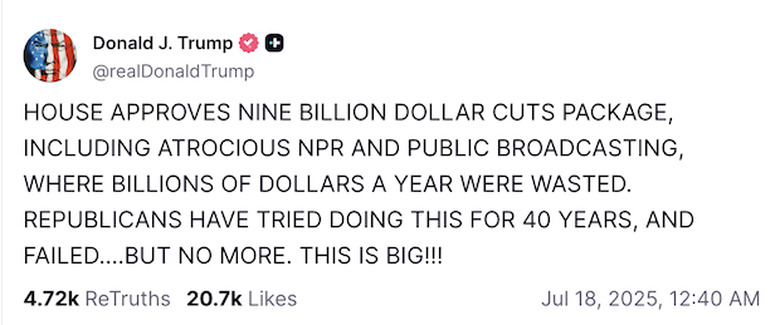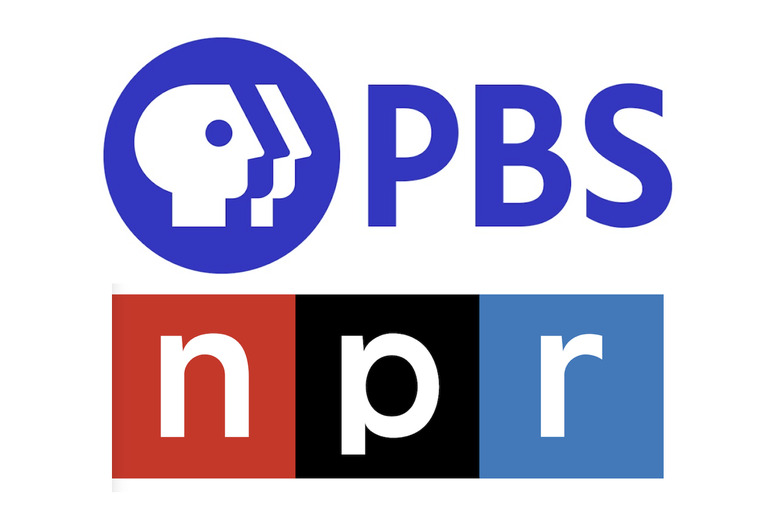PBS, NPR To Lose All Federal Funding As Congress Votes To Pass Rescissions Bill — 'This Is Big!' Cheers Trump
The Republican-led House of Representatives voted 216-213 early Friday morning to pass a proposal from President Donald Trump to cancel $9.4 billion in previously approved federal funding — including all $1.1 billion that the Corporation for Public Broadcasting, which helps fund PBS and NPR, expected to receive over the next two years.
Two Republicans, Representatives Brian Fitzpatrick of Pennsylvania and Michael R. Turner of Ohio, opposed the measure.
The Senate had approved the proposal early Thursday a.m., in a 51-48 vote. As it awaits Trump's signature, POTUS on Truth Social cheered the vote to defund what he described as the "ATROCIOUS" PBS and NPR:

The approved legislation also rescinds $8 billion in foreign aid spending, including $800 million for a program that provides emergency shelter and sanitation for those who flee their home countries, and $500 million to provide food, water and health care for countries hit by natural disasters and conflicts.
TRUMP TARGETS 'BIASED MEDIA'
President Trump, in a May 1 executive order titled "Ending Taxpayer Subsidization of Biased Media," cited the CPB's governing statute — that it may not "contribute to or otherwise support any political party" — before arguing, "The CPB fails to abide by these principles to the extent it subsidizes NPR and PBS.
"Which viewpoints NPR and PBS promote does not matter. What does matter is that neither entity presents a fair, accurate, or unbiased portrayal of current events to taxpaying citizens," the executive order read. "I therefore instruct ... all executive departments and agencies to cease Federal funding for NPR and PBS."
HOW WILL THIS IMPACT PBS?
PBS President and CEO Paula Kerger, in a statement issued after the Senate vote, said that the rescissions bill — the first of its kind since 1999 — "goes against the will of the American people, the vast majority of whom trust PBS and believe we provide excellent value to their communities.
"These cuts will significantly impact all of our stations, but will be especially devastating to smaller stations and those serving large rural areas," Kerger added. "Many of our stations which provide access to free unique local programming and emergency alerts will now be forced to make hard decisions in the weeks and months ahead."
The Corporation for Public Broadcasting traditionally receives an annual congressional appropriation of about $500 million, which it in turn appropriates to some 1,500 public TV and radio stations, as well as to NPR and PBS (to support national programming). Without CPB funds, stations will need to rely on donations from viewers, corporate sponsorships, and foundation grants to cover their operating budgets.
With the CPB budget due to be zeroed out starting this fall, the expectation is that local stations, which have a harder time time with member donation drives, will be forced off the air. But even larger stations will be faced with layoffs, fewer resources for news reporting, and less money with which to buy educational programming.
Daniel Tiger's Neighborhood, for example, is among the children's shows produced by Fred Rogers Productions, a nonprofit funded in part by the CPB as well as licensing revenue from PBS stations.
THIS IS ONLY 'THE BEGINNING' OF RESCISSIONS
The $9.4 billion rescissions bill aims to reclaim a fraction of a fraction of federal spending after Trump's "One Big Beautiful Bill Act" got pushed through on July 4, even though the Congressional Budget Office projected it will increase future federal deficits by about $3.3 trillion over a decade.
House Speaker Mike Johnson, per ABC News, promised that there would be additional rescissions bills coming: "This isn't the end, it's the beginning."
